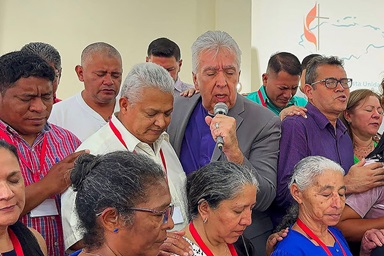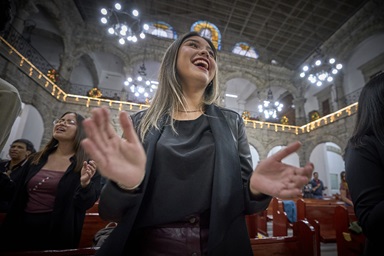The mission team women who came here last month from Suncreek United Methodist Church dubbed themselves “The Delicate Flowers,” an ironic nod to three hard days of building a cinder-block home for a needy family.
The name caught on with the Rev. Martin Lechuga, the Mexican crew team leader who oversaw their grunt labor.
“Delicate Flowers, bring your shovels!” he called out at one point.
They did. Indeed, on Feb. 19 – first day of the blitz build – the five women rarely put their shovels down, using them to dig a foundation and turn heavy sand piles for mixing mortar.
Any short-term groans yielded to overall satisfaction.
“This is my happy place,” said Rita Thomas, a veteran of scores of home-building trips with Proyecto Abrigo (Project Shelter), a mission group in Juárez. “I get here and something peaceful comes over me.”
From 2011 to 2013, United Methodists who had made many trips to Juárez, across the border from El Paso, Texas, found themselves unable to come because of drug cartel-related violence.
But Juárez is quieter now, and groups like this one from Suncreek United Methodist – in Allen, Texas, near Dallas – are finding their way back.
“It’s coming along,” said the Rev. Jose Luis Portillo, a Christian and Missionary Alliance pastor and Proyecto Abrigo’s executive director. “We hope to raise about 20 homes this year.”
Proyecto Abrigo operates a medical clinic and community center, but its focus is replacing the cardboard and wood-pallet shacks occupied by poor families with cinder-block homes. They’re small and spartan – 12 ft. x 24 ft.; no running water – but represent a big step up in shelter.
As recently as 2007, Proyecto Abrigo was building 200 such homes a year, with United Methodists providing nearly all the financial support and volunteer labor.
Portillo expanded Proyecto Abrigo’s dorms to accommodate all the mission teams, but not fast enough.
“We even had to cancel teams because we did not have space,” Portillo said.
Murder capital
But beginning in 2007, violence and kidnappings escalated sharply in Juárez, due to a war between drug cartels. By 2010, Juárez became known as the world’s murder capital, with eight homicides a day.
With news coverage of the violence, the number of visiting mission teams dropped precipitously. But a few United Methodist churches, such as Suncreek, kept coming.
“You’d see trucks just full of the federal police,” said Janet Hunt, director of community ministries at Suncreek and board chair of Proyecto Abrigo. “They had built bunkers and trenches. They were all along the road, pointing machine guns.”
Suncreek had a trip scheduled for January 2011, but a few days before departure Portillo called it off. He’d heard gunfire coming from a store near the dormitories, an episode he later learned had claimed the lives of three bystanders.
So the hiatus for mission groups began. Suncreek continued to send money for home building by local crews, but the veteran volunteers longed to return.
“It was hard,” Hunt said. “We kept calling, saying, `Are you sure it’s not OK?’”
But Proyecto Abrigo would lose one of its own to homicide, beloved crew team member Ernesto Alonso León Soto, in what Portillo described as a classic “wrong place at the wrong time” scenario.
`90 percent safer’
By 2013, news organizations were reporting a sharp drop in violence in Juárez. Theories about why that happened include a sorting out of the conflict between drug cartels, and more effective local policing. Portillo believes withdrawal of federal troops – which had their own reputation for violence and corruption – was key.
Whatever the reason, the drop in violence gave mission leaders confidence.
“We did begin again last summer to take mission teams back to Juárez,” said Rich Mackey, director of Arrow Outreach, a Texas nonprofit that does construction projects with volunteers. “Things calmed very much to pre-2008 levels.”
Portillo began inviting teams back in 2013, with Suncreek accepting right away. The mission built nine homes that year, and 14 in 2014.
But while Portillo believes Juárez is “90 percent safer,” he acknowledges its reputation lingers, posing an obstacle for pastors who would send teams, and for family members and friends of volunteers.
That was confirmed by Dawn Moneyheffer, an Indiana resident who came on the trip last month with close friend Lori Wagner, a former Suncreek staff member.
“My sister, she’s just freaked out because of the word `Juárez,’” Moneyheffer said.
The radio game
Of the six-member Suncreek group, Moneyheffer was the only rookie. The others – four women and a man – had been at least once, most of them multiple times.
Suncreek covered, through fundraisers, the $3,200 cost for construction materials and skilled labor. The volunteers paid for their plane tickets and the $25 per day room and board at Proyecto Abrigo.
For this, they got to do manual labor several hours a day, in a trash-strewn landscape, with the wind blowing so hard at times that they lowered bandanas over their mouths.
But they also got to know the eight-member Quinoñes family, which would be moving into the cinder-block home. It’s developing a relationship with the family, and knowing they’re going to have a better life, that forms the commitment to this kind of volunteering, according to veteran mission team members.
“My way of looking at it is, you do this one family at a time,” said Christine Scott, a Suncreek member who first came to Proyecto Abrigo in 2003.
It wasn’t all work. The trip included a nightly devotional, nightly card games, and designated times for shopping and eating out.
There also was laughter on van rides to and from the work site, with the seasoned volunteers playing a favorite game – trying to guess whether the Spanish song playing on the radio was happy or sad.
At the site, The Delicate Flowers joked about their own fitness, or lack thereof, for construction. Their male colleague wasn’t buying it.
“These ladies bust their rear ends,” said Ken Kiser. “Actually, they put me to shame.”
*Hodges, a United Methodist News Service writer, lives in Dallas. Contact him at (615) 742-5470 or [email protected]
Like what you're reading? Support the ministry of UM News! Your support ensures the latest denominational news, dynamic stories and informative articles will continue to connect our global community. Make a tax-deductible donation at ResourceUMC.org/GiveUMCom.









